Q: According to a recent study by Oracle and Future Workplace, 93 per cent of people would trust artificial intelligence (AI) to make decisions for them at work. I know that Stefanini has developed Sophie, a corporate AI agent based on based on cognitive computing and artificial intelligence: How will robots transform the workplace in the next decade or two?
A: Robots will become a standard element of the workplace of the future, co-working with humans. AI-like technology will become part of all devices we use in the future. I wouldn’t say that robots are the future of workplace productivity but they are definitely part of this future. And, as a matter of fact, Sophie is not leading the way from this perspective. RPA (Robotic Process Automation) has been around for over a decade. In the future, AI enabled productivity will become more and more common in the workplace. Sophie is just the start.
Q: What has the employee response been to Sophie? Have you seen any resistance?
A: It depends a lot of how she gets introduced and what tasks she is expected to support or resolve. Sophie, like any other chatbot/personal assistant, falls under the family of automation tools; in this case what is being automated is the conversation with a human. So the employee response to Sophie is somehow similar to the response to other automation tools, ranging from the: “Is she going to steal my job?” type of reaction to the joy of being freed from repetitive tasks. What we have noticed is that the reactions to Sophie are one or two levels more positive than to other automation tools, for the reason that Sophie is automating interaction with users, which tends to be more “unpleasant” than plain back-office activities.
Q: What are the direct benefits from employing Sophie?
A: Sophie, unlike human employees, is available 24/7 and delivers consistent quality and is cheaper. But the benefits of implementing Sophie go beyond cost saving. They include higher customer satisfaction, increased customer interaction and sales, help in reaching new customers and gaining a deeper understanding of customers.
Q: Do you see Sophie’s capabilities extending beyond customer service, in the future?
A: That is already happening. Even though indeed, the immediate usability is in the customer support area, Sophie can be applied in other areas. An “intelligent” concierge bot could even leverage past requests to provide quick actions such as, “Do you want to book the usual?” Sales teams can take advantage of chatbots because they are ideal for cross-selling. For example, a mobile operator could initiate a conversation between an existing customer to offer a broad data package, subscriptions to partner offerings, or other products that fit their profile. Alternatively, a chatbot could participate in the sales process by generating leads for the sales team. Chatbots can trigger conversations to gather data. With regulations changing all the time, chatbots can reach out to customers to ask for the data necessary for banks to remain compliant. They can verify data for journaling purposes, such as verifying a customer’s address. Outbound chat conversations are particularly powerful because they allow companies to reach customers on their existing channels. Chats or messages are also less invasive than a phone call, and require only a few seconds to complete. Sophie can also be a personal assistant.
Q: Can Sophie’s performance be improved?
A: Well, any technology can always be improved. The same applies for Sophie. Its cognitive capabilities get better automatically when it is being used. We are working on improving using voice as an input channel as it is currently limited to chat conversations only. Sophie could also understand narrative text not just dialog flows. We can improve voice communication, pre-packing certain functionalities and extend the set out-of-the-box of connectors.
—
Emerging Europe is organising a two-day InnoTech Nordics summit in Copenhagen and Stockholm on November 20-21 which takes an in-depth look at the Nordic tech scene, and how technology bridges can be built between the Nordics and emerging Europe. More details here.






Add Comment